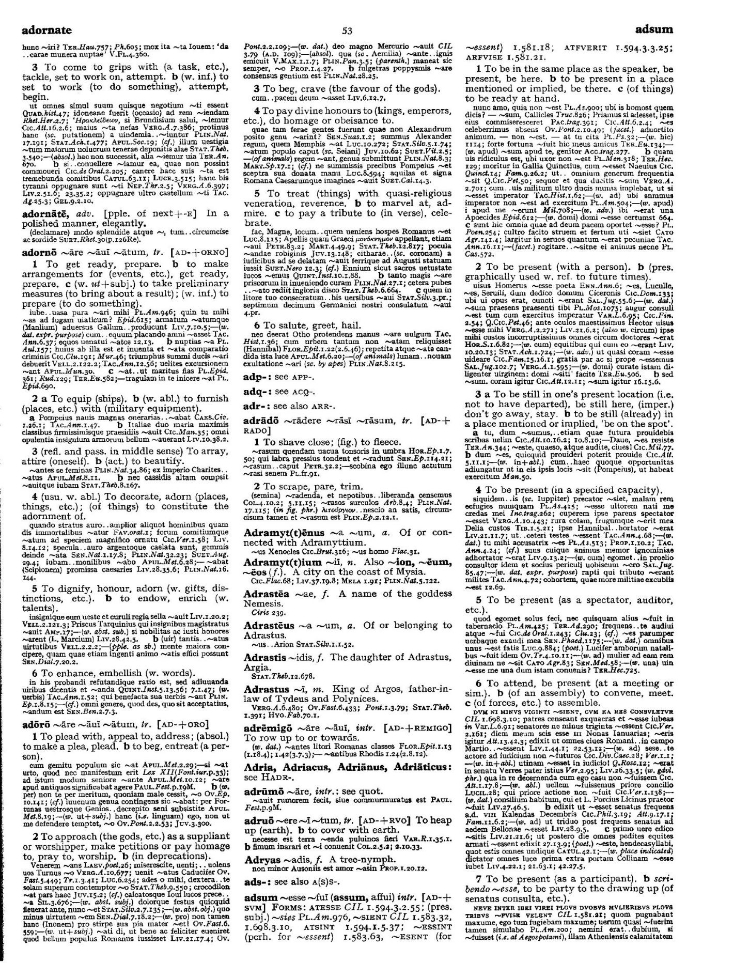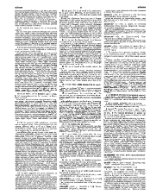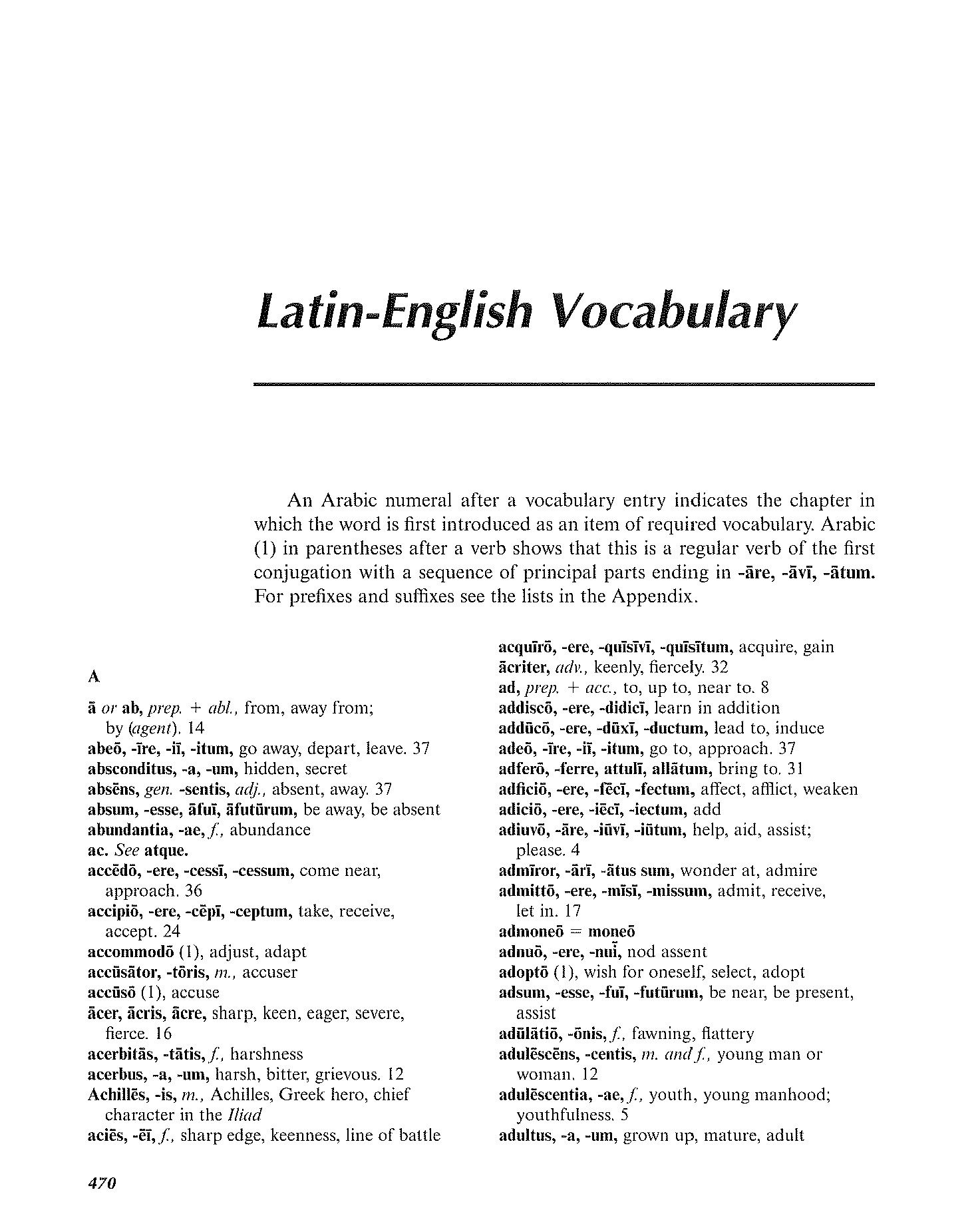
page_listing.tpl
page_subListingDetails.tpl
sub_listingDetails_style1.tpl
sub_listingDetails.title.tpl
adesse to be present
adesse is a Latin Verb that primarily means to be present.
Definitions for adesse
Wheelock's Latin
Verb
- 1
be near, be present, assist
Oxford Latin Dictionary
Verb
- 1
To be in the same place as the speaker, be present, be here. (b) to be present in a place mentioned or implied, be there. (c) (of things) to be ready at hand.
- 2
To be present (with a person). (b) (pres. graphically used w. ref. to future times).
- 3
(a) To be still in one's present location (i.e. not to have departed), be still here, (imper.) don't go away, stay. (b) to be still (already) in a placed mentioned or implied, 'be on the spot'.
- 4
To be present (in a specified capacity).
- 5
To be present (as a spectator, auditor, etc.).
Sentences with adesse
Latin to English
Idus Martius adsum reus iubeo, qui dies novus magistratus ineo honor.Compare He ordered the defendant to be present on the Ides of March, on which day the new magistrates were about to enter upon their office.
Qui noster res dispenso, neque adsum istic, neque, ubi terra sum scio.Compare He, who managed our affairs, is neither present here, nor do I know where in the world he is.
Adsum adolescens, qui pater principatus totus Gallia obtineo.Compare A youth was present, whose father had obtained the sovereignty of all Gaul.
Praetereo hora. Iam adsum extremus.Compare The hour has passed. The end is now at hand.
Conjugation table for adesse
Cactus2000
| ACTIVE | |
| Indicative present | Indicative imperfect |
| adsum ades adest adsumus adestis adsunt | aderam aderās aderat aderāmus aderātis aderant |
| Indicative perfect | Indicative pluperfect |
| adfuī / affuī adfuistī / affuistī adfuit / affuit adfuimus / affuimus adfuistis / affuistis adfuērunt / adfuēre / affuērunt / affuēre | adfueram / affueram adfuerās / affuerās adfuerat / affuerat adfuerāmus / affuerāmus adfuerātis / affuerātis adfuerant / affuerant |
| Indicative future | Indicative future perfect |
| aderō aderis aderit aderimus aderitis aderunt | adfuerō / affuerō adfueris / affueris adfuerit / affuerit adfuerimus / affuerimus adfueritis / affueritis adfuerint / affuerint |
| Subjunctive present | Subjunctive imperfect |
| adsim / adfuam adsīs / adfuas adsit / adfuat adsīmus adsītis adsint / adfuant | adessem / adforem adessēs / adforēs adesset / adforet adessēmus adessētis adessent / adforent |
| Subjunctive perfect | Subjunctive pluperfect |
| adfuerim / affuerim adfueris / affueris adfuerit / affuerit adfuerimus / affuerimus adfueritis / affueritis adfuerint / affuerint | adfuissem / affuissem adfuissēs / affuissēs adfuisset / affuisset adfuissēmus / affuissēmus adfuissētis / affuissētis adfuissent / affuissent |
Infinitive present adesse Infinitive perfect adfuisse / affuisse Infinitive future adfutūrum esse | Imperative present ades adeste Imperative future adestō adestō adestōte adsuntō |
| PARTICIPLE | ||
| Participle present active | ||
| - | - | |
| - | - | |
| - | - | |
| - | - | |
| - | - | |
| Participle future active | ||
| adfutūrus | adfutūrī | |
| adfutūrus | adfutūrī | |
| adfutūrus | adfutūrī | |
| adfutūrus | adfutūrī | |
| adfutūrus | adfutūrī | |
| Participle perfect passive | ||
| - | - | |
| - | - | |
| - | - | |
| - | - | |
| - | - | |
| Gerundive | ||
| - | - | |
| - | - | |
| - | - | |
| - | - | |
| - | - | |
| Gerund | Supine | |
| - | - | |
| - | - | |
| - | ||
| - | ||
| - | ||
| PARTICIPLE | ||
| Participle present active | ||
| Nom. | - | - |
| Gen. | - | - |
| Dat. | - | - |
| Acc. | - | - |
| Abl. | - | - |
| Participle future active | ||
| Nom. | adfutūrus | adfutūrī |
| Gen. | adfutūrī | adfutūrōrum |
| Dat. | adfutūrō | adfutūrīs |
| Acc. | adfutūrum | adfutūrōs |
| Abl. | adfutūrō | adfutūrīs |
| Participle perfect passive | ||
| Nom. | - | - |
| Gen. | - | - |
| Dat. | - | - |
| Acc. | - | - |
| Abl. | - | - |
| Gerundive | ||
| Nom. | - | - |
| Gen. | - | - |
| Dat. | - | - |
| Acc. | - | - |
| Abl. | - | - |
| Gerund | Supine | |
| Nom. | - | - |
| Gen. | - | - |
| Dat. | - | |
| Acc. | - | |
| Abl. | - | |
Data sources
Notes
- Definitions
- Frederick M. Wheelock, Wheelock's Latin, 6th ed., rev. Richard A. LaFleur (New York, NY: HarperCollins Publishers, 2005): 470.
- P. G. W. Glare, Oxford Latin Dictionary, Vols. 1-8 (Oxford: Clarendon Press, 1982): 53.
- Word frequencies
- Christopher Francese, "Latin Core Vocabulary," Dickinson College Commentaries, last modified 2014, http://dcc.dickinson.edu.
- Paul B. Diederich, The Frequency of Latin Words and Their Endings, PhD diss., (Columbia University, 1939).
Bibliography
Allen, Joseph H. Allen and Greenough's New Latin Grammar for Schools and Colleges: Founded on Comparative Grammar. Edited by James B. Greenough, George L. Kittredge, Albert A. Howard, and Benjamin L. D'Ooge. Boston, MA: Ginn & Company, 1903.
Crystal, David. A Dictionary of Linguistics and Phonetics. 6th ed. Oxford, UK: Blackwell Publishing, 2008.
Delatte, Louis, Suzanne Govaerts, Joseph Denooz, and Etienne Evrard. Dictionnaire fréquentiel et index inverse de la langue latine [Frequency Dictionary and Inverse Index of the Latin Language]. Liège, Belgium: Laboratoire d'analyse statistique des langues anciennes de l'Université de Liège (L.A.S.L.A.), 1981.
Diederich, Paul B. The Frequency of Latin Words and Their Endings. PhD diss., Columbia University, 1939.
Francese, Christopher. "Latin Core Vocabulary." Dickinson College Commentaries. Last modified 2014. http://dcc.dickinson.edu/latin-vocabulary-list.
Gildersleeve, Basil L., and Gonzales Lodge. Gildersleeve's Latin Grammar: Third Edition, Revised, and Enlarged. 3rd ed. London, England: Macmillan and Co., 1903.
Glare, Peter G.W. Oxford Latin Dictionary. Vols. 1-8. Oxford, England: Clarendon Press, 1982.
Krüger, Bernd. "Latin Conjugation Tables." Cactus2000. Accessed May 5, 2023. https://latin.cactus2000.de/index.en.php.
Pierson, Nick. "Sound of Text." Accessed October 26, 2019. https://soundoftext.com.
Wheelock, Frederick M. Wheelock's Latin. 6th ed. Revised by Richard A. LaFleur. New York, NY: HarperCollins Publishers, 2005.
Wiktionary Contributors. "Victionarium." Wikimedia Foundation, Inc. Updated March 18, 2019. https://la.wiktionary.org/wiki/Victionarium:Pagina_prima.
Citation
Chicago (17th ed.)
Allo Contributors. "adsum, adesse, adfuī, adfutūrum (v.) - Latin Word Definition." Allo Latin Dictionary. Last modified . Accessed February 19, 2026. http://ancientlanguages.org/latin/dictionary/adsum-adesse-adfui-adfuturum.
Entry created on . Last updated on .








